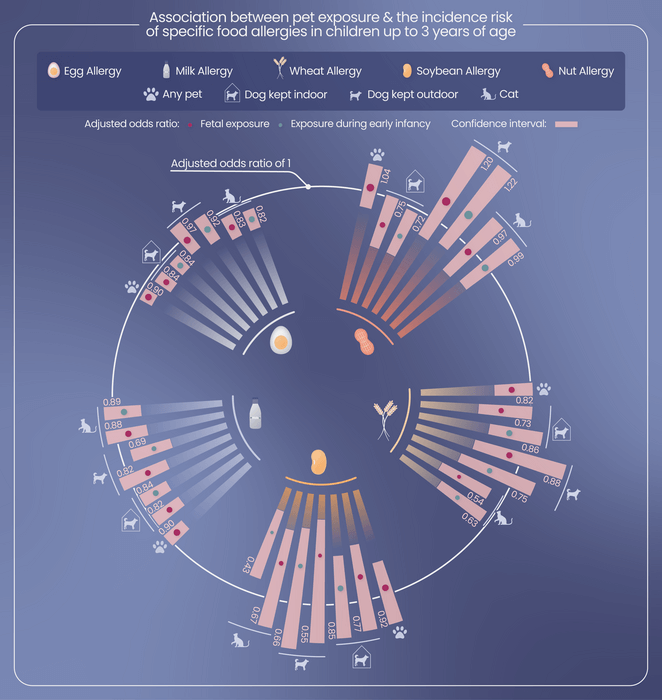
Do you have kids and pets in your home? If so, you might be happy to know that a new study from Japan suggests that living with cats and dogs can reduce the likelihood of developing food allergies in children.
The research published in the journal PLOS ONE, involved 66,000 kids who grew up around dogs and reported fewer egg, milk, and nut allergies. While those with cats were linked to fewer egg, wheat, and soybean allergies.
The study also revealed that exposure to pets at an early age could be particularly beneficial. Children who lived with indoor dogs before birth had even lower rates of allergies than those who lived with dogs after birth.
Hisao Okabe from Fukushima Medical University conducted research on the link between pet exposure and food allergies. The researchers analyzed data from a nationwide survey of Japanese children aged 3 to 6 years old, conducted in 2017 and 2018. The survey asked parents about their child’s history of food allergies and their exposure to pets both during pregnancy and after birth.
Pets reduce allergies in kids

An allergy occurs when the immune system mistakes harmless substances in the environment as threats and attacks them. This can lead to a range of symptoms, from skin irritation to life-threatening reactions. Common allergens for children include milk, eggs, peanuts, tree nuts, sesame, fish, and shellfish.
“Pet exposure may increase abundance of certain gut microbes as well as contribute to the diversity of gut bacteria, which is possibly associated with lower rates of allergic disease. Our findings suggest that exposure to dogs and cats might be beneficial against the development of certain food allergies, thereby alleviating concerns about pet keeping and reducing the burden of food allergies.”
Dr. Hisao Okabe
While the link between pet exposure and food allergies is not yet fully understood, one theory is that pets may alter infants’ microbiomes and protect them from developing sensitivities. Allergies are becoming increasingly common in developed countries, affecting over 10 percent of the population. It’s crucial to investigate the underlying reasons for this trend and explore potential solutions to mitigate it.
Early exposure to pets can have positive effects on children’s health.
Studies have shown that infants who live with pets are less likely to develop respiratory illnesses and asthma, while pets are linked to better mental and physical health in adults. Adopting a furry friend could have a positive impact on the health of the entire household. In 2012, a study published in August edition of Pediatrics, by Eija Bergroth, MD, of Finland’s Kuopio University Hospital, and colleagues found that babies who grow up with dogs are 31% more likely to be healthy in their first year compared to those without a dog. On the other hand, kids from homes with cats are 6% more likely to be healthy than those in cat-free families. These findings suggest that maintaining a too-sanitized environment may not be beneficial for babies’ health.
Pet exposure may impact food allergies due to the “hygiene hypothesis,” which suggests that contact with bacteria and other microbes, including those from animals, is crucial for developing a strong immune system.
Read also: Amazing companies that promote ‘Bring Your Dog to Work’
Of course, pets are not a cure-all for allergies, and if you’re considering getting a pet for your family, it’s important to choose a pet that’s a good fit for your lifestyle. At the risk of sounding like a broken record, we can’t emphasise enough that Getting a pet solely for preventing child illnesses makes as little sense as stressing about getting rid of your furry friend for fear of harm to your newborn.
